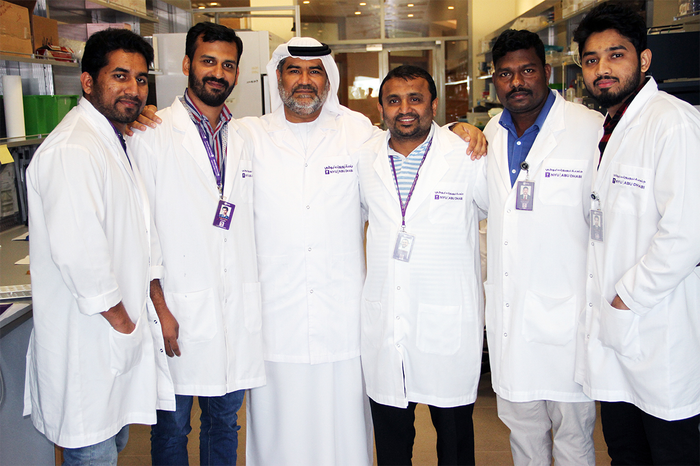Abu Dhabi, May 25, 2022: A team led by Professor of Biology, Senior Vice Provost of Research at NYU Abu Dhabi, and UAE national Sehamuddin Galadari, has discovered a novel structural modification in AMP-activated protein kinase (AMPK) during anticancer therapy that could pave the way for the development of more effective cancer treatments.

Credit: NYU Abu Dhabi
Abu Dhabi, May 25, 2022: A team led by Professor of Biology, Senior Vice Provost of Research at NYU Abu Dhabi, and UAE national Sehamuddin Galadari, has discovered a novel structural modification in AMP-activated protein kinase (AMPK) during anticancer therapy that could pave the way for the development of more effective cancer treatments.
AMPK normally works as the cellular energy sensor that is activated when there is a shortage of energy in the body. Once activated, AMPK kickstarts events in the cell that restore the energy balance. The major component of AMPK exists as two isoforms (functionally similar proteins) – AMPK-⍺1 and AMPK-⍺2.
In a paper titled Caspase cleavage and nuclear retention of the energy sensor AMPK-α1 during apoptosis in Cell Reports, the research team identified that the caspase-3 enzyme specifically cleaves AMPK-⍺1 (but not -⍺2) during anticancer treatment. The scientists also identified the precise location of the truncation – the process of shortening something by removing a part of it – and found that, as a result, cleaved AMPK-⍺1 gets trapped in the cell nucleus.
The findings are of significant clinical and biological importance because they will help researchers design and develop a drug that specifically targets cleaved AMPK-⍺1 within the nucleus, which could increase the effectiveness of existing chemotherapy or radiotherapy.
Commenting on the findings, Galadari said: “Despite the advances in biomedical research and clinical applications, cancer remains a leading cause of death worldwide. Most anticancer drugs act by inducing death in cancer cells. However, resistance to therapy continues to be the principal limiting factor in achieving cures against cancer. In our work based on cell culture models, we noticed that the cleaved AMPK-⍺1 retained in the nucleus confers protection from cell death induced by anticancer drugs, causing resistance to chemotherapy.”
The study was done in collaboration with Professor Grahame Hardie from the School of Life Sciences, University of Dundee. Hardie, a pioneer in AMPK research, discovered and defined AMPK in the 1980s and characterized several of its functions.
NYUAD researcher and senior author of the paper Faisal Thayyullathil commented: “Interestingly, the gene encoding AMPK-α1 is frequently amplified in human cancers. Our results suggest that genomic instability in such tumors might precipitate caspase cleavage and nuclear retention of the amplified AMPK-α1, thus protecting the tumor cells against cell death.”
NYUAD researcher and first author of the paper Anees Rahman added: “Improved understanding of compartment-specific functions of cleaved AMPK- α1 will aid us in the development of strategies to optimize the clinical outcome of therapeutic interventions.”
ENDS
About NYU Abu Dhabi
NYU Abu Dhabi is the first comprehensive liberal arts and science campus in the Middle East to be operated abroad by a major American research university. NYU Abu Dhabi has integrated a highly-selective liberal arts, engineering and science curriculum with a world center for advanced research and scholarship enabling its students to succeed in an increasingly interdependent world and advance cooperation and progress on humanity’s shared challenges. NYU Abu Dhabi’s high-achieving students have come from 115 nations and speak over 115 languages. Together, NYU’s campuses in New York, Abu Dhabi, and Shanghai form the backbone of a unique global university, giving faculty and students opportunities to experience varied learning environments and immersion in other cultures at one or more of the numerous study-abroad sites NYU maintains on six continents.
Journal
Cell Reports
Article Title
Caspase cleavage and nuclear retention of the energy sensor AMPK-α1 during apoptosis




